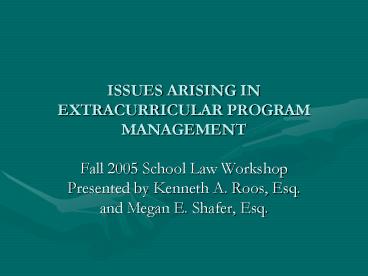ISSUES ARISING IN EXTRACURRICULAR PROGRAM MANAGEMENT - PowerPoint PPT Presentation
1 / 22
Title:
ISSUES ARISING IN EXTRACURRICULAR PROGRAM MANAGEMENT
Description:
ISSUES ARISING IN EXTRACURRICULAR PROGRAM MANAGEMENT. Fall 2005 School Law Workshop ... of positions on an athletic team, or the amount of play time a student receives ... – PowerPoint PPT presentation
Number of Views:58
Avg rating:3.0/5.0
Title: ISSUES ARISING IN EXTRACURRICULAR PROGRAM MANAGEMENT
1
ISSUES ARISING IN EXTRACURRICULAR PROGRAM
MANAGEMENT
- Fall 2005 School Law WorkshopPresented by
Kenneth A. Roos, Esq. and Megan E. Shafer, Esq.
2
WHO CAN PARTICIPATE (Restrictions May Apply)
- Approved Private School or Non-Traditional
Placement - Alternative Placement
- MCIU
- RTF
- PRRI
- Homebound
- Charter School (Cyber or Regular)
3
Charter School
- School District can require that a student
enrolled in a charter school demonstrate that he
or she meets those requirements before allowing
that student to participate in school activities.
See Angstadt v. Midd-West Sch. Dist., 377 F.3d
338 (3rd Cir. 2004).
4
WHO CANT ?
- Private School (Sectarian or non-Sectarian)
- Includes Release in Lieu of FAPE
5
Home Schooled Stand By
- Senate Bill 361 passed by full Senate
- would require all school districts to allow
home-schooled students to participate in
extracurricular activities, including - clubs, sports, musical ensembles, and theatrical
productions. - Home-schooled students still required to meet the
equivalent participation and try-out criteria as
students enrolled in the district.
6
Pennsylvania Interscholastic Athletic Association
Rules and Regulations
- Transfer from Another School
- Eligible unless recruited
- Exception for Hurricane Katrina
- Age
- Eligible unless student reached 19th birthday by
June 30th preceding the school year. - For 7th and 8th grade students, 15th birthday by
the June 30th cut off date. - A student with a disability may receive a waiver
of the age limitation.
7
Eligibility - Academic
- Academic Requirements
- Enrolled full time in the school where he or she
intends to participate - Absent 20 days or less per semester.
- Eligibility extends for only 4 years after grade
8. - must be passing in four full credit courses every
Friday of the marking period. - otherwise ineligible for one week.
8
Section 504 Students with Handicaps
- Equal Opportunity Standard
- Less than an entitlement
- Unless provided for directly in the students IEP
and deemed to be an essential component of the
students educational program - Should happen rarely
- Triggers transportation obligation
- More like a privilege
9
Section 504 cont
- Not required to fundamentally alter program
- No undue burden
- Financial
- Administrative
10
Programs with Essential Eligibility Requirements
- not required to waive eligibility requirements or
automatically qualify students with disabilities - must meet the same essential eligibility
requirements as nondisabled students - affirmative obligation on schools to consider
whether the student with a disability would be
able to meet essential eligibility standards with
the provision of additional modifications, or
auxiliary aids and services. - i.e. interpreter services, personal aides, and
protective equipment and gear
11
Programs with Essential Eligibility Requirements
(cont)
- decisions regarding the assignment of positions
on an athletic team, or the amount of play time a
student receives are not discriminatory where
they are based on competent judgments about the
students skill level and ability.
12
Programs Which Are Generally Open to the Student
Population
- Least restrictive environment principles apply
- Have decision made by informed IEP team
- Be aware of transportation obligations
13
Other Limitations and Restrictions
- Safety Risks
- Maximum Age Eligibility
- Minimum Grades or Credit Hour
- Practical Considerations
14
Title IX Issues
- athletic financial assistance
- effective accommodation of student interests and
abilities (i.e., participation rates) - other program components
15
Title IX - applicability
- Interscholastic athletics
- Intramural sports
- Physical education courses
- Other school-sponsored athletic programs.
16
Other Program Components
- Equipment and Supplies
- Scheduling of Games and Practice Times
- Travel and Daily Allowance
- Coaching
- Locker Rooms, Practice and Competitive Facilities
- Medical and Training Facilities and Services
- Publicity
- Support Services
17
Title IX Options
- Substantially proportionate athletic
opportunities for male and female athletes - A history and continuing practice of expanding
opportunities for the under-represented sex - Full and effective accommodation of the interests
and abilities of the under-represented sex.
18
Other Athletic Program Components
- OCR looks for a disparity between the mens and
womens programs. - defined as a difference, on the basis of sex, in
benefits or services, which has a negative impact
on athletes of one sex when compared with
benefits or services available to athletes of the
other sex. - Applies to overall program
- Nondiscriminatory factors may account for
differences
19
OCR Investigations of Program Components
- Usually limited to specific program component
- Differences balanced and possibly offset
- Investigator has great latitude
20
Booster Clubs
- Other athletic benefits is not limited to those
benefits paid directly by the school itself. - includes those benefits paid by booster clubs, by
team fund-raising activities and by any other
source. - need to monitor the distribution of all benefits
to all teams
21
Challenge to Title IX enforcement
- Appeal from the National Wrestling Coaches
Association rejected by U.S. Supreme Ct. - accuses federal officials of discriminating
against male athletes - lawsuit should have been filed against individual
colleges that eliminated mens sports, not the
federal government.
22
PART-TIME EMPLOYMENT OF PSERS RETIREES
- separate contract for extracurricular position
performed primarily outside regular instructional
hours and not part of the mandated educational
curriculum. - primarily means that more than half of the
extracurricular employment hours are outside the
schools regularly scheduled class hours. - Specifically includes the position of athletic
director, and other administrative positions that
do not directly work with students. - Contract must include a waiver of any potential
retirement benefits from the extracurricular
employment.































